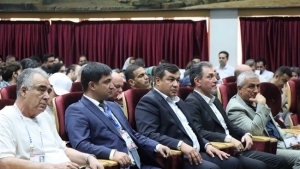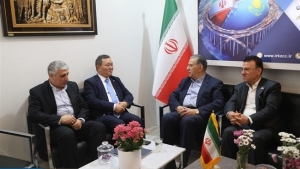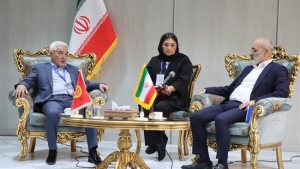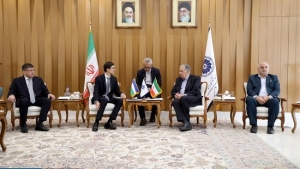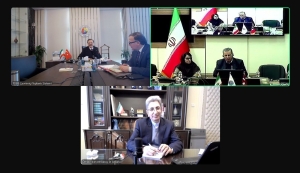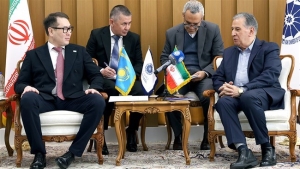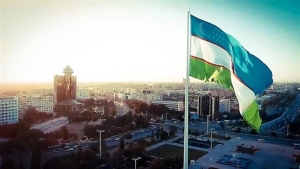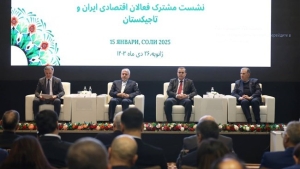Member Countries
ecocci
Tehran and Tashkent push to double trade volume, eye $1 billion target
Iran and Uzbekistan are intensifying efforts to expand bilateral trade, with Iranian officials calling for the swift conclusion of a preferential trade agreement and greater economic integration between the two countries.
At a joint business forum held on the sidelines on Iran Expo 2025, Payam Bagheri, Vice President of Iran Chamber of Commerce, Industries, Mines, and Agriculture, said the $500 million trade volume recorded in 2024 falls short of the countries’ true potential.
“There is strong enthusiasm on both sides, rooted in shared cultural and historical ties,” Bagheri noted. “Iran has substantial capacity in agriculture, food production, mining, energy, tourism, and other industries.”
Bagheri argued that implementing a preferential trade agreement would significantly accelerate trade growth and help unlock new economic opportunities. He also emphasized the importance of easing banking restrictions, expanding the list of traded goods, lifting Uzbekistan’s business visa requirements, and encouraging cooperation in technology and innovation sectors.
Bagheri reaffirmed Iran’s readiness to send and receive trade delegations, saying stronger institutional cooperation could help trade between the two nations exceed $1 billion in the near future.
Iran explores private sector cooperation with Afghanistan, Oman at Iran Expo 2025
Vice presidents of Iran Chamber of Commerce, Industries, Mines, and Agriculture (ICCIMA) held separate meetings with business delegations from Afghanistan and Oman on the second day of Iran Expo 2025, aiming to enhance private sector cooperation between the countries.
The Iran Chamber’s booth at the exhibition became a hub of economic dialogue on Tuesday, attracting visits from business leaders, trade officials, and government figures.
Mohammad Younus Mohmand, President of the Afghanistan Chamber of Commerce and Investment, led a delegation in talks with Mohammad Reza Bahraman and Payam Baqeri, vice presidents of the Iran Chamber of Commerce.
Baqeri said the Afghan delegation's presence helped establish direct ties between traders from both countries. He stressed that close collaboration between the Iranian and Afghan chambers is essential for expanding bilateral economic cooperation.
He also highlighted Afghanistan’s market potential and revealed plans for the Iran Chamber to send a trade mission to Kabul in the near future. However, he pointed out that resolving ongoing banking issues between the two countries remains critical for progress.
Mohmand, while acknowledging the importance of cooperation, expressed concerns over challenges faced by Afghan investors in Iran. He urged Iranian authorities to create more favorable conditions for Afghan business activities.
Baqeri responded that the Iran Chamber stands ready to facilitate Afghan investment and is committed to addressing investor concerns.
Later, Baqeri also met with the President of the Oman Chamber of Commerce and Industry in North Al Sharqiyah Governorate. The two sides discussed boosting commercial exchanges and explored opportunities for broader provincial-level cooperation. The Omani delegation emphasized the importance of mutual trade visits and invited the Iran Chamber to dispatch a business delegation to Oman.
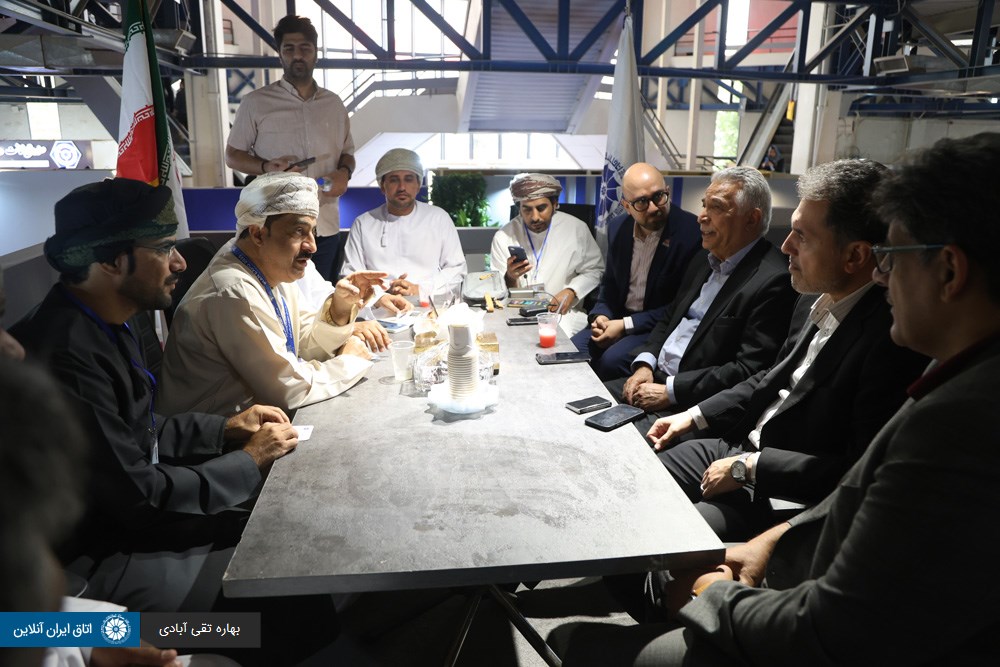
Iran, Kazakhstan eye deeper trade ties following Eurasian agreement
The finalization of Iran’s free trade agreement with the Eurasian Economic Union (EAEU) has opened new avenues for trade between Iran and Kazakhstan, potentially boosting bilateral trade to several billion dollars, the president of Iran Chamber of Commerce, Industries, Mines and Agriculture said on Thursday.
Speaking during a meeting with Kazakhstan’s ambassador to Tehran at the Iran Expo 2025, Samad Hassanzadeh, emphasized the importance of the newly implemented free trade agreement, calling it a “promising achievement” for Iranian businesses and the EAEU member states.
“The agreement, which took effect about a month ago, lays the groundwork for expanded trade with countries in the region, particularly Kazakhstan,” Hassanzadeh said, adding that cooperation in investment and the transfer of knowledge and new technologies from Iran to Kazakhstan was a key area of interest.
To unlock the full potential of the partnership, Hassanzadeh called for the easing of trade regulations, streamlined visa issuance, resolution of banking challenges, and improved transportation infrastructure.
Kazakhstan’s ambassador to Iran, Ontalap Onalbayev, who also visited the Iran-Kazakhstan Joint Chamber of Commerce pavilion at the expo, praised the scope and quality of Iran Expo 2025, calling it “exceptional.”
“I have visited the exhibition since the first day and observed its high standards. With over 1,000 Iranian companies participating, the event offers an excellent opportunity for Kazakh and other international firms to explore Iran’s capabilities,” Onalbayev said.
He expressed hope that Kazakh companies attending the expo would seize the opportunity to connect with their Iranian counterparts.
Despite international sanctions, Iranian companies have made significant technological advances, the ambassador added. He noted the potential for Iranian firms to transfer know-how to Kazakhstan in areas such as machinery manufacturing and information technology.
Onalbayev also encouraged long-term Iranian business engagement in Kazakhstan, emphasizing that expanding bilateral ties is both feasible and beneficial for both nations.
Iran, Kyrgyzstan call for banking agreements, joint investment to boost trade
Senior business leaders from Iran and Kyrgyzstan have urged the formation of joint investment strategies and banking agreements to unlock the full trade potential between the two countries, which remains far below capacity.
Qadir Qiafeh, Vice President of the Iran Chamber of Commerce, Industries, Mines, and Agriculture, said bilateral trade currently stands at $106 million – an amount he described as insufficient given the opportunities available to both nations.
“Joint investment in logistics and transportation can help reduce the final cost of goods for both sides,” Qiafeh said at a meeting with his Kyrgyz counterpart on the sidelines of Iran Expo 2025 in Tehran on Thursday. “We also need clear banking and monetary agreements to advance our economic ties.”
He called on the chambers of commerce and small and medium-sized enterprises (SMEs) in both countries to develop a targeted plan to expand trade cooperation. Participation in each other’s specialized exhibitions, he added, could enhance mutual understanding and foster effective private-sector links.
Mamasadyk Bakirov, Vice President of the Kyrgyz Chamber of Commerce and Industry, echoed the sentiment, saying that while the two nations have significant potential, some obstacles must be addressed. “We must explore practical ways to bring our business communities closer together,” he said.
He noted that Iran currently enjoys a trade surplus in bilateral exchanges, but said a more balanced trade relationship is needed. Bakirov proposed the creation of a joint chamber of commerce and the establishment of trade centers in Tehran and Bishkek as concrete steps toward deepening economic relations.
Upcoming preferential trade deal expected to boost Iran-Uzbekistan economic ties
Iran and Uzbekistan plan to sign a preferential trade agreement next month during a joint economic commission meeting, a move expected to enhance trade cooperation between the two countries, according to the president of Iran Chamber of Commerce, Industries, Mines and Agriculture.
Samad Hassanzadeh, speaking at a meeting with Shokhrukh Gulamov, Uzbekistan’s Deputy Minister of Investment, Industry, and Trade, said the upcoming agreement could significantly elevate bilateral trade.
“The current trade volume of nearly $500 million does not reflect the real potential of the two countries,” Hassanzadeh said. “Iran’s private sector, represented by the Chamber, is fully ready to take all necessary steps to increase trade.”
He highlighted the upcoming Iran Expo, starting April 28, where a business delegation from Uzbekistan is expected to participate. Hassanzadeh pointed to Iran’s industrial and economic capacities—particularly in engineering services, petrochemicals, oil, food industries, and automobile manufacturing—as areas with strong potential for cooperation.
Stressing Iran’s commitment to strengthening ties with neighbors and countries worldwide, he added that the private sector is equally determined to support this strategy.
The Iran chamber of Commerce president also called for the reciprocal removal of visa requirements for Iranian citizens by Uzbekistan, arguing it would ease travel for businesspeople and boost tourism.
He noted that Iranian companies are particularly interested in joint investments in Uzbekistan’s textile and apparel sectors. Hassanzadeh expressed hope that with closer collaboration between the two countries’ chambers of commerce, trade volume could reach $1 billion.
Uzbekistan’s Deputy Minister Gulamov echoed the sentiment, stating that the historical and cultural ties between the two nations form a strong foundation for enhanced cooperation and joint investment.
“More than 100 Uzbek companies, led by the president of our Chamber of Commerce, will participate in Iran Expo. This reflects the importance of Iran for Uzbekistan,” Gulamov said.
He welcomed Iranian private sector investment in Uzbekistan and outlined an ambitious goal: “With the existing capacities, we should aim to increase trade volume to $5 billion.”
Turkey’s “discriminatory” regulations impeding trade with Iran: Chamber of Commerce president
President of Iran Chamber of Commerce, Industries, Mines, and Agriculture, Samad Hassanzadeh, criticized Turkey’s discriminatory trade regulations against Iranian goods which he believed were hindering the development of bilateral economic ties.
Hassanzadeh made the remarks in an online meeting on Tuesday with Rifat Hisarciklioglu, the President of the Union of Chambers and Commodity Exchanges of Turkey (TOBB).
He expressed concern that some of Turkey's trade policies, especially its special tariffs on Iranian products compared to European goods, have created significant barriers. He emphasized that these measures are detrimental to the goal of increasing trade volume between the two nations, which is targeted to reach $30 billion.
He highlighted the issue of tariffs introduced in January on Iranian trucks at the Turkish border, which caused delays and a halt in the flow of goods. Though the issue was temporarily resolved through negotiations, Hassanzadeh said that the solution might not be permanent, and called for a lasting resolution to ensure the smooth movement of trucks across the border.
Hassanzadeh also discussed the plan to establish a joint chamber of commerce between Iran and Turkey, expressing readiness to finalize the necessary arrangements for signing the agreement.
In response, Rifat Hisarciklioglu confirmed that the joint chamber will be inaugurated in March and invited Hassanzadeh to attend the opening ceremony.
Hisarciklioglu also requested that the Iranian side provide a list of products facing trade obstacles, to be addressed in discussions with Turkey's Minister of Trade. He acknowledged some of the restrictions affecting bilateral trade and pledged to work towards resolving them, including the issue of Iranian truck traffic at the border.
The two sides agreed to continue their discussions in a bid to overcome the challenges impeding trade and enhance economic cooperation.
Iran, Kazakhstan urged to lift banking, transportation hurdles to reach $3 billion trade target
Iran and Kazakhstan are working to expand their bilateral trade to over $3 billion, but unresolved banking and transportation issues remain key obstacles, President of Iran Chamber of Commerce, Industries, Mines, and Agriculture (ICCIMA) said on Saturday.
Sammad Hassanzadeh emphasized the need for improved financial transactions and logistics infrastructure during a meeting with Kazakhstan’s Minister of Trade, Arman Shakkaliyev.
Iran's diverse production capabilities allow for increased exports to Kazakhstan, particularly in food industries, petrochemicals, engineering services, construction, and medical equipment, Hassanzadeh said. He noted that joint projects in energy, textiles, and mining could further strengthen economic ties.
Despite multiple cooperation agreements signed between the two nations, Hassanzadeh lamented that many remain unimplemented. He also urged greater tourism and trade delegation exchanges, especially following the mutual visa exemption agreement.
Shakkaliyev acknowledged Iran's strong potential in technical and engineering services and expressed interest in expanding trade in building materials, medical devices, machinery, and food industries. "We can increase annual trade in technical services alone to $500 million," he said.
However, the Kazakh minister stressed that banking issues must be resolved to facilitate trade. "Without solving financial transaction barriers, increasing trade volume will be difficult. We have proposed solutions and are hopeful for progress," he said.
On logistics, Shakkaliyev pointed to the importance of the International North-South Transport Corridor (INSTC) as a means to enhance connectivity between the two countries.
Iran eyes partnership in Uzbekistan’s construction sector
Head of Iran-Uzbekistan Joint Chamber of Commerce has highlighted the need for Iran to gain a foothold in Uzbekistan’s construction industry.
In an interview with Iran Chamber of Commerce newsroom on Saturday, Mousa Aghaei referred to Uzbekistan’s 2030 Vision Plan, which has strong focus on improving the country’s infrastructure especially in the area of construction and road building.
He said that exports of techno-engineering services are among the points of strength of Iran’s private sector that have to be used.
Aghaei added that an Iranian private sector delegation is to attend Uzbekistan’s Construction Exhibition (UzBuild) due to be held in Tashkent on February 25-27.
He referred to the strong presence of Russia, China and South Korea in Uzbekistan, and stressed that "We must strive not to fall behind our rivals.
Iran-Tajikistan Business Forum focusses on tourism cooperation
During an Iran-Tajikistan Business Forum on Wednesday, the two sides discussed ways for expansion of tourism cooperation between the two nations.
Addressing the forum, President of Iran Chamber of Commerce, Industries, Mines, and Agriculture (ICCIMA) Samad Hassanzadeh urged the need for Iran and Tajikistan to introduce their tourism attractions, referring to wavering of visa requirements for Tajik citizens by Iranian President Masoud Pezeshkian which enables Tajik people to travel to Iran from every point of the country.
He also said that Iran and Tajikistan can give a boost to their cooperation in different areas, including, techno-engineering, oil, gas, medical equipment, and health tourism.
Hassanzadeh hailed the cultural commonalities between the two countries which he believed could pave the way for enhancement of their economic relations.
Iran’s Minister of Cultural Heritage, Handcrafts and Tourism, Reza Salehi Amiri, who was also present at the forum, said that the two countries have agreed to increase bilateral tourism exchanges so that the number of Tajik tourists visiting Iran and Iranian tourists visiting Tajikistan will reach 100,000 annually. In a meeting earlier in the day he had said that the number currently stands at as low as 8,500.











